|
|
|
Sort Order |
|
|
|
Items / Page
|
|
|
|
|
|
|
| Srl | Item |
| 1 |
ID:
172875


|
|
|
|
|
| Summary/Abstract |
Kazakhstan has followed a foreign policy of multivector diplomacy since its independence from the former Soviet Union. While multivectorism was a strategy of necessity in its early years, it has evolved to empower Kazakhstan to effectively protect its independence and negotiate its relationship with the great powers on its borders and further afield. After the 2014 Russian seizure of Crimea it is noteworthy that Kazakhstan has maintained positive relations with Russia while asserting its sovereignty and independent foreign policy. In this article we investigate how Kazakhstan has negotiated the rise of China, taking advantage of the economic opportunities it presents. We trace the foreign policy of Kazakhstan from independence forward, examining its relationships with its Great Power neighbours and its role in international organizations and negotiations. We posit that multivectorism is similar to the strategy of omni-enmeshment and complex balancing seen in south-east Asia. Both are effective methods for secondary powers to protect their sovereignty and to coexist with Great Powers without becoming their client states. Kazakhstan's approach to foreign policy is an exemplar for secondary states. This article contributes to the literature on the strategic decision-making of secondary powers and to the theoretical analysis of the foreign policy of Kazakhstan during a critical moment of transition from the long-time rule of Nursultan Nazarbayev to the presidency of Kassym-Jomart Tokayev.
|
|
|
|
|
|
|
|
|
|
|
|
|
|
|
|
| 2 |
ID:
172871
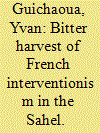

|
|
|
|
|
| Summary/Abstract |
This article studies the bitter diplomatic sequence arising in the fall of 2019 between France and the Sahelian countries where France has been conducting military operations since 2013. Far from being just one more hiccup in the troubled relations between France and its former colonies, the article interprets this sequence as a constitutive effect of French protracted military presence in the Sahel. Specifically, it argues that although France has a rather clear security-driven agenda, its operational moves produced by bureaucratic thinking are questioned by influential sections of Sahelian public opinions who frame the French military presence as a deeply political issue over their country's sovereignty. In addition, being the de facto military guarantor of the security of Sahelian regimes, France constrains the domestic political conversation through the ‘red lines’ it imposes on actors. This externally-induced distortion of the domestic political landscape eventually places Sahelian authorities in front of a dilemma. Pleasing their foreign patrons might cost them the support of the section of public opinion most attached to national sovereignty, and expose them to nationalist entrepreneurs.
|
|
|
|
|
|
|
|
|
|
|
|
|
|
|
|
| 3 |
ID:
172869
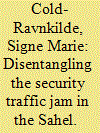

|
|
|
|
|
| Summary/Abstract |
Despite years of ongoing interventions by multiple external and regional actors, the security situation in west Africa's Sahel region is dramatically deteriorating. In this introduction to the special section of the July 2020 issue of International Affairs, we zoom in on four major external international intervention actors (France, the United States, the European Union and the United Nations) in the Sahel region's escalating ‘security traffic jam’. We argue that the diversity of intervention actors makes the Sahel a paradigmatic case for exploring a set of often-overlooked constitutive intervention effects. By adding new temporal, relational and spatial dimensions to the notion of ‘constitutive effects’ as introduced by post-structuralists in the 1990s, we (re)launch constitutive effects as a conceptual framework for approaching the study of ongoing intervention engagements. From this perspective, and as further illustrated in this special section, intervention continuity and escalation cannot be explained simply with reference to frameworks of ‘success’ or ‘failure’, but require a broader conceptualization of effects, including how specific threat perceptions, rationales and problematizations get constituted and consolidated through and during ongoing intervention practice. Contributions to this special section each unpack a diverse set of constitutive effects including the contested performance of security actorness, the (un)making of security alliances and partnerships, logics of choices produced by ongoing intervention practices, as well as the constitution of conditions for continual international involvement.
|
|
|
|
|
|
|
|
|
|
|
|
|
|
|
|
| 4 |
ID:
172874


|
|
|
|
|
| Summary/Abstract |
This article provides a comprehensive analysis of the Islamic State's use of images taken by drones, drawing on a dataset of ISIS propaganda images from October 2016 to December 2018. Analysing the three principal uses of drone imagery by ISIS—images of drone strikes, images of other attacks and observation—we argue that ISIS's use of drones distinguishes itself from other state and non-state uses of drones primarily by its communicative and symbolic value. While ISIS’ use of drone strikes takes place in a tactical rather than strategic setting, its employment of drones to film VBIED attacks allows them to achieve a strategic effect. After outlining ISIS’ use of drones for combat air support and to film ground (particularly VBIED) attacks, we argue, drawing on political geography, that ISIS employs drones in propaganda to stake and reinforce a claim to sovereign control of territory, performed through the flying of aircraft. The use of drone imagery, we argue, taps into long-standing visual and discursive strategies which associate vertical hierarchy and flying with mastery and control, allowing ISIS to display attributes of aerial sovereignty. This article, through an analysis of ISIS drone propaganda, provides a rare insight into non-state actors’ perception of drones and the communicative value of drone images, in addition to suggesting further avenues for the incorporation of political–geographical studies of verticality into the study of political violence and rhetoric.
|
|
|
|
|
|
|
|
|
|
|
|
|
|
|
|
| 5 |
ID:
172878


|
|
|
|
|
| Summary/Abstract |
Governments deploy policies that strive to increase the participation rates of under-represented demographic groups (according to gender, ethnicity, sexuality and disability status) in innovative activities. A growing thrust of these policies focuses on accumulating non-financial resources, particularly social capital, as the strategy for improving inclusion. Such policies include mentoring and networking schemes, role model campaigns, competitions and prizes. In contrast to the policies' growing prevalence, only a handful of studies have empirically analysed them, and fewer still offered analytical conceptualizations. In this article, we contribute by applying insights from the extant scholarship on social capital, innovation and entrepreneurship to conceptualize the policies in bonding and bridging social capital terms. We find that bonding strategies foster in-group connections, with the primary aim of encouraging under-represented groups to want to participate, thus focusing on increasing the supply of labour. Bridging strategies, in contrast, strive to link under-represented groups with finance and other centres of power, and to update societal preferences, in order to increase the demand for labour from under-represented groups. Our novel conceptualization emphasizes that policies should be studied according to their bonding or bridging social capital aims, as even the same policy instrument (i.e., mentorship scheme or campaign) can differ significantly in how it is employed.
|
|
|
|
|
|
|
|
|
|
|
|
|
|
|
|
| 6 |
ID:
172879


|
|
|
|
|
| Summary/Abstract |
Existing scholarship on North Korea's nuclear programme remains overwhelmingly centred around questions of containment or engagement with the North Korean regime-state, amid international calls for denuclearization. Yet, scholarship has rarely interrogated the precise value of nuclear weapons to the regime-state. This article develops a new theoretical framework of nuclear ideology to explore the puzzle of the survival of North Korea. This framework aims to show how the North Korean nuclear programme is deeply entrenched within the state ideology of juche, as one device for continued regime-state survival. Through interviews with elite North Korean defectors and textual analysis of North Korean and international sources, I show that North Korea's nuclear ideology has been constructed according to different frames of meaning, targeting referent actors of international ‘enemy’ powers and domestic audiences. This article concludes that nuclear ideology functions primarily as a tool to arouse domestic legitimacy for the North Korean regime-state, by targeting elite actors within the highly stratified domestic population. From an international perspective, perception of North Korea's survival remains tied largely to the regime-state's physical possession of nuclear weapons. This article has extremely timely theoretical and policy implications given the current ‘dialogue’ between US and North Korean leaders. First, it opens up fruitful avenues of inquiry surrounding questions of the legitimacy of rogue states within international relations. Secondly, this article calls for a more robust understanding of the domestic-level politics of North Korea, in order to understand the regime-state's foreign policy decisions vis-à-vis its nuclear programme.
|
|
|
|
|
|
|
|
|
|
|
|
|
|
|
|
| 7 |
ID:
172877
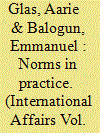

|
|
|
|
|
| Summary/Abstract |
The Association of Southeast Asian Nations (ASEAN) and the Economic Community of West African States (ECOWAS) both recently adopted and institutionalized the norm of people-centric governance. This is potentially transformative for both, signalling a reorientation away from their private and elite-led normative foundations. In practice, however, the norm is understood and enacted in different ways by officials at each organization and with radically different effects. In ASEAN, the norm is understood and enacted in a limited and defensive way. Its institutionalization has led only to selective engagement with civil society and has not altered established modes of regional governance. In ECOWAS, however, the norm is understood as a means to render the organization more inclusive of civil society groups and has transformed the regional project in important ways, shaping the logic and form of regional intervention and conflict prevention. To explore these experiences—convergence in adoption and institutionalization of a norm and variation in its practice and effect—we develop a practice theoretic framework and rely on 76 interviews with regional and state officials. We show that each organizational case is usefully conceptualized as a community of practice wherein external norms are understood and practiced in particular ways and with particular effect.
|
|
|
|
|
|
|
|
|
|
|
|
|
|
|
|
| 8 |
ID:
172872


|
|
|
|
|
| Summary/Abstract |
The work of international interventions, whether grandiose or commonplace in scale, requires credible, verified information. Nevertheless, in settings of armed conflict that interventions aim to transform, information is more often than not improvised, unofficial, fragmented and based on multiple competing imaginaries. Interventions, therefore, are significantly influenced by rumours: the circulation of information and stories based on uncertain accounts of questionable provenance. Research on international intervention has neglected the place and power of rumour. To address this lacuna, this article examines the impact of rumour on the intervention logics and practices of the United Nations Multilateral Stabilization Mission in Mali (MINUSMA). It argues that rumours evince an epistemological force that generates constitutive effects among different sets of conflict actors in Mali. To address the impacts of rumours, different divisions within the intervention pursue practices of investigation, correction and officialization. Nevertheless, by enacting these practices, political tensions emerge that reveal contradictory intervention logics within MINUSMA, and foster conflictual relations between the intervention and different conflict actors in the country, thereby decreasing how Malians perceive MINUSMA's legitimacy.
|
|
|
|
|
|
|
|
|
|
|
|
|
|
|
|
| 9 |
ID:
172873


|
|
|
|
|
| Summary/Abstract |
Because of its geographical proximity to the EU, the Sahel region's perceived cross-border security threats of terror, migration and organized crime have become a top European security policy priority. Contributing to existing debates on EU external actions, the article develops the idea that the EU's engagement in the Sahel has become an attempt to construct and confirm the Union's ability to act as a global security actor. Through the analytical lens of ‘translation’ emphasizing the continuous transformation of norms and ideas by actors and contexts, the article examines how EU staff implement shifting policy objectives in their security practices in Mali; the effects these intervention practices produce; and how, in turn, these effects reflect back upon the EU's role as a security actor. The article shows how the EU's actorness and ability to perform security are hampered by the lack of buy-in from their local partners, as narrating success in a context of escalating violence becomes increasingly implausible. Thus, we argue that while the EU's activities in Mali reinforce the idea of the EU as a security actor, the limited character and impact of the EU's activities on the ground also reinforce the idea of it as a limited or even ineffective actor. The article thereby provides fruitful input to discussions of the constitutive effects of everyday practices in interventions and the production of EU security actorness as played out in the Sahel.
|
|
|
|
|
|
|
|
|
|
|
|
|
|
|
|
| 10 |
ID:
172876
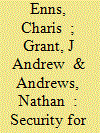

|
|
|
|
|
| Summary/Abstract |
In this article, we analyse the factors underpinning the shift towards hybrid security governance in Africa. Extant scholarship largely attributes this shift to broader global processes, such as histories of colonialism, neoliberalism and transformations in global governance, which have served to legitimize the role of private authority in security provision around sites of resource extraction. Our analysis seeks to understand the relative and relational influence of power and rules in international politics by offering empirical insights about what hybrid security arrangements look like ‘on the ground’. Drawing upon recently conducted fieldwork in Kenya, Uganda and Ghana, we examine how hybrid security arrangements affect the lives of those living near sites of natural resource extraction. Our analyses suggest that although hybrid security has emerged as the leading approach to security governance, this approach to security does not uniformly involve or serve the interests of all stakeholders. Rather, we find that hybrid security arrangements aid the security of extractive operations—securing investments in both physical and human capital—while sometimes undermining the security of nearby communities.
|
|
|
|
|
|
|
|
|
|
|
|
|
|
|
|
| 11 |
ID:
172870
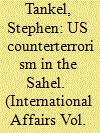

|
|
|
|
|
| Summary/Abstract |
The massive expansion and evolution of United States security cooperation under the auspices of the ‘war on terror’ remains overlooked in the counterterrorism and interventions literature. The Sahel provides a useful region in which to explore the constitutive effects of such cooperation and its evolution because the US has always pursued an ‘economy of force’ mission there. In this article, I focus mainly on the constitutive effects of US indirect military intervention in the Sahel after 9/11, and subsequent more direct military intervention following the outbreak of civil war in Mali. The indirect intervention by the United States to build the capacity of local forces in Mali, where jihadists were based, failed because of the dissonant relationship between the two countries. This led the United States to intervene more directly in the region, including through its cooperation with and support for French and Nigerien forces. The nature of this more direct military intervention was also informed by evolving US experiences working by, with and through partner forces in other parts of the world.
|
|
|
|
|
|
|
|
|
|
|
|
|
|
|
|
|
|
|
|
|